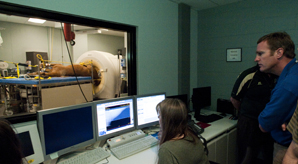
Veterinary Diagnostic Imaging

Contact Veterinary Diagnostic Imaging
(970) 297-1293
Pets that have been diagnosed with hyperthyroidism can be treated with radioactive iodine, which has a high success rate at selectively destroying the overactive parts of the thyroid gland. This treatment is performed more often in cats, although dogs are occasionally diagnosed and treated by this same method, often referred to as Iodine-131 or I-131 therapy or treatment.
The diagnosis of hyperthyroidism requires careful consultation with your veterinarian, who also should check your pet for other medical problems such as heart or kidney disease. Your veterinarian will order a blood test to check thyroid hormone levels and to detect overactivity in the thyroid gland.
If treatment with radioactive iodine at our hospital is being considered, a Tapazole Challenge Test must first be done by your primary veterinarian. Tapazole is a medicine that temporarily reduces the excessively high thyroid hormone levels in a hyperthyroid pet. When these levels go down because of the Tapazole medication, an older animal's kidneys may show signs of failure. This test is done to help make sure that your pet's kidneys will still be functioning well if the more permanent treatment is performed.
Prior to treatment, your animal's diet will need to be adjusted for two weeks so that the Iodine-131 therapy will work well. Speak with your veterinarian for more details about how to adjust your pet's diet
Typically, your hyperthyroid pet will be evaluated and admitted on a Monday and a nuclear medicine thyroid scan will be performed later that day. On Tuesday morning the radioiodine treatment will be given.
Your pet will stay hospitalized until the end of the week. Although the majority of treated animals can go home Friday afternoon, occasionally a pet will have to remain in the hospital through the weekend so that the levels of radiation in their body has decreased sufficiently for release. While your pet is undergoing therapy, it will stay in a special radiotherapy hospital ward and be cared for by our staff.
The length of hospitalization for dogs having this treatment is usually longer than for a cats, and depends upon a number of factors. This type of treatment for your dog can be discussed with you in greater detail by your CSU veterinarians.